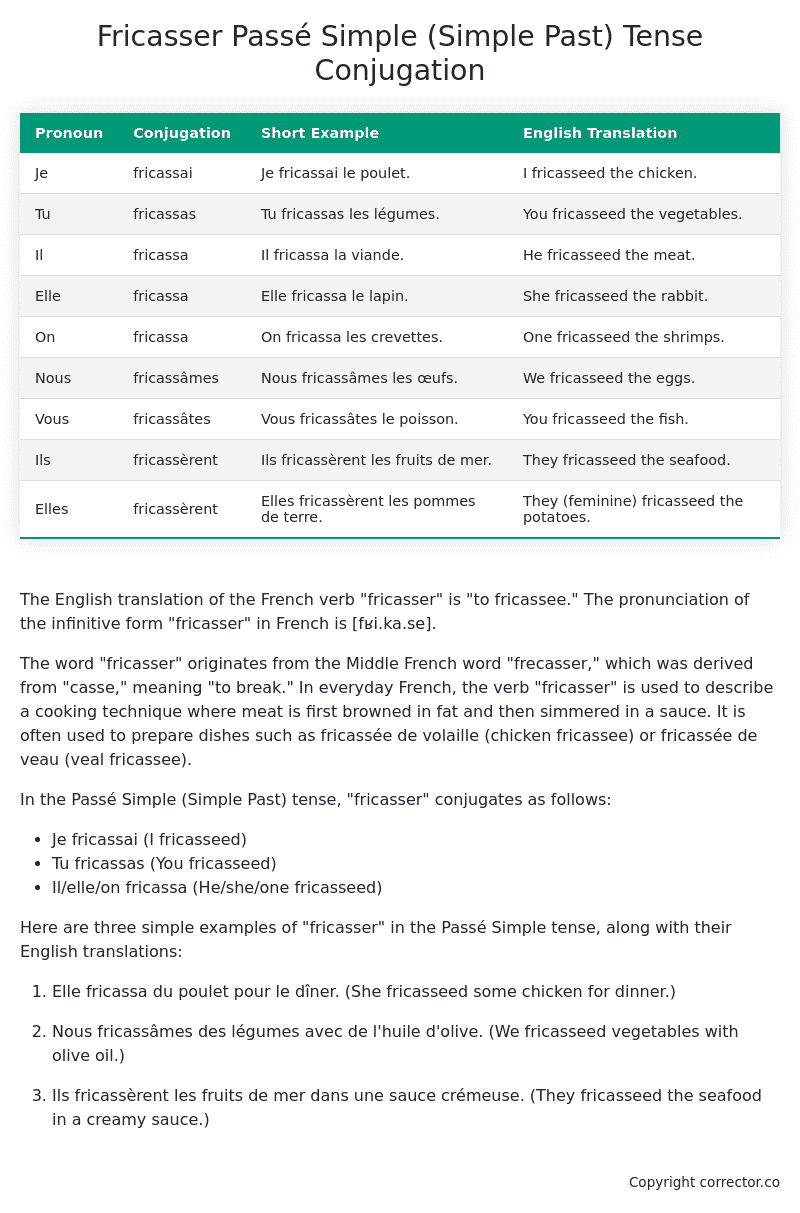Passé Simple (Simple Past) Tense Conjugation of the French Verb fricasser
Introduction to the verb fricasser
The English translation of the French verb “fricasser” is “to fricassee.” The pronunciation of the infinitive form “fricasser” in French is [fʁi.ka.se].
The word “fricasser” originates from the Middle French word “frecasser,” which was derived from “casse,” meaning “to break.” In everyday French, the verb “fricasser” is used to describe a cooking technique where meat is first browned in fat and then simmered in a sauce. It is often used to prepare dishes such as fricassée de volaille (chicken fricassee) or fricassée de veau (veal fricassee).
In the Passé Simple (Simple Past) tense, “fricasser” conjugates as follows:
- Je fricassai (I fricasseed)
- Tu fricassas (You fricasseed)
- Il/elle/on fricassa (He/she/one fricasseed)
Here are three simple examples of “fricasser” in the Passé Simple tense, along with their English translations:
-
Elle fricassa du poulet pour le dîner.
(She fricasseed some chicken for dinner.) -
Nous fricassâmes des légumes avec de l’huile d’olive.
(We fricasseed vegetables with olive oil.) -
Ils fricassèrent les fruits de mer dans une sauce crémeuse.
(They fricasseed the seafood in a creamy sauce.)
Table of the Passé Simple (Simple Past) Tense Conjugation of fricasser
| Pronoun | Conjugation | Short Example | English Translation |
|---|---|---|---|
| Je | fricassai | Je fricassai le poulet. | I fricasseed the chicken. |
| Tu | fricassas | Tu fricassas les légumes. | You fricasseed the vegetables. |
| Il | fricassa | Il fricassa la viande. | He fricasseed the meat. |
| Elle | fricassa | Elle fricassa le lapin. | She fricasseed the rabbit. |
| On | fricassa | On fricassa les crevettes. | One fricasseed the shrimps. |
| Nous | fricassâmes | Nous fricassâmes les œufs. | We fricasseed the eggs. |
| Vous | fricassâtes | Vous fricassâtes le poisson. | You fricasseed the fish. |
| Ils | fricassèrent | Ils fricassèrent les fruits de mer. | They fricasseed the seafood. |
| Elles | fricassèrent | Elles fricassèrent les pommes de terre. | They (feminine) fricasseed the potatoes. |
Other Conjugations for Fricasser.
Le Present (Present Tense) Conjugation of the French Verb fricasser
Imparfait (Imperfect) Tense Conjugation of the French Verb fricasser
Passé Simple (Simple Past) Tense Conjugation of the French Verb fricasser (You’re reading it right now!)
Passé Composé (Present Perfect) Tense Conjugation of the French Verb fricasser
Futur Simple (Simple Future) Tense Conjugation of the French Verb fricasser
Futur Proche (Near Future) Tense Conjugation of the French Verb fricasser
Plus-que-parfait (Pluperfect) Tense Conjugation of the French Verb fricasser
Passé Antérieur (Past Anterior) Tense Conjugation of the French Verb fricasser
Futur Antérieur (Future Anterior) Tense Conjugation of the French Verb fricasser
Subjonctif Présent (Subjunctive Present) Tense Conjugation of the French Verb fricasser
Subjonctif Passé (Subjunctive Past) Tense Conjugation of the French Verb fricasser
Subjonctif Imparfait (Subjunctive Imperfect) Tense Conjugation of the French Verb fricasser
Subjonctif Plus-que-parfait (Subjunctive Pluperfect) Tense Conjugation of the French Verb fricasser
Conditionnel Présent (Conditional Present) Tense Conjugation of the French Verb fricasser
Conditionnel Passé (Conditional Past) Tense Conjugation of the French Verb fricasser
Conditionnel Passé II (Conditional Past II) Tense Conjugation of the French Verb fricasser
L’impératif Présent (Imperative Present) Tense Conjugation of the French Verb fricasser
L’impératif Passé (Imperative Past) Tense Conjugation of the French Verb fricasser
L’infinitif Présent (Infinitive Present) Tense Conjugation of the French Verb fricasser
L’infinitif Passé (Infinitive Past) Tense Conjugation of the French Verb fricasser
Le Participe Présent (Present Participle) Tense Conjugation of the French Verb fricasser
Le Participe Passé (Past Participle) Tense Conjugation of the French Verb fricasser
Struggling with French verbs or the language in general? Why not use our free French Grammar Checker – no registration required!
Get a FREE Download Study Sheet of this Conjugation 🔥
Simply right click the image below, click “save image” and get your free reference for the fricasser Passé Simple tense conjugation!

Fricasser – About the French Passé Simple (Simple Past) Tense
Formation
Usage
Narration
Historical Context
Interactions with other tenses
Passé Composé
Imparfait
Conditional and Subjunctive
Summary
I hope you enjoyed this article on the verb fricasser. Still in a learning mood? Check out another TOTALLY random French verb conjugation!


